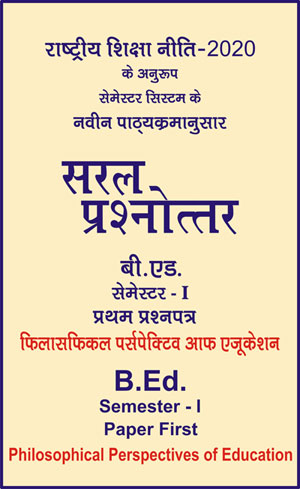|
बी एड - एम एड >> बी.एड. सेमेस्टर-1 प्रश्नपत्र-I - फिलासफिकल पर्सपेक्टिव आफ एजुकेशन बी.एड. सेमेस्टर-1 प्रश्नपत्र-I - फिलासफिकल पर्सपेक्टिव आफ एजुकेशनसरल प्रश्नोत्तर समूह
|
5 पाठक हैं |
|||||||
बी.एड. सेमेस्टर-1 प्रश्नपत्र-I - फिलासफिकल पर्सपेक्टिव आफ एजुकेशन (अंग्रेजी भाषा में)
Question- Discuss the sociological concept of education.
Answer -
The Sociological Concept of Education
The thought centre of sociologists is society. They see and understand the individual in the context and perspective of his society. They consider education as a means of development of the individual and society. They have revealed the following facts about the nature of education process:
- Education is a Social Process: Sociologists explained that when there is a social interaction between two or more persons, they are influenced by each other’s language, thought and behavior. This process of being influenced is called learning and when this work is done keeping certain objectives in front, then it is called education. We know that human beings are born with certain powers. In the natural and social environment, these powers develop and as a result there is a change in the behavior of man. For example, the system of pronouncing sounds is acquired by man from birth, but through this system he (child) learns the language only from the people with whom he comes in contact and with whom he exchanges ideas. The development of the entire civilization and culture of man is the result of social process. Yes, it is a matter of course that after the development of sense organs knowledge of language, man independently observes, examines, thinks and contemplates and learns in this way too, but for this the development of sense organs, language, knowledge and thought power takes place only in the social environment. In the absence of society, we can neither learn language nor think. Children acquire the knowledge of the things around them, language and actions by staying in the society.
-
Education is a Continuous Process: The second fact revealed by sociologists regarding education is that education always continues in the society. From a few days after the birth of a man, his education starts and continues till the end of life and if we see from a more detailed point of view, the members of the society (individuals) keep on ending but their education process continues from generation to generation. He never takes rest. Thus, continuity is its second characteristic.
-
Education is a Bi-directional (two-faced) Process: Sociologists have clarified that in the process of education one side effects and the other side is affected. So, it is clear that education is a bi-directional process. According to him, there are two directions of education - One is who influences (the teacher) and the other is who is affected (the learner). American educationist John Dewey has also considered two directions of education - one is psychological and the other is social. By psychological part, they mean the interest, tendency and strength of the learner and by social part, they mean his social environment. But it is my own experience that not only the social environment, but also the natural environment affects the learning process. In the context of planned education, teachers, objectives of teaching, curriculum and methods of teaching are also effective factors. We call all these as learning situations. Then it is more appropriate to say that the process of education takes place between the learner and the learning situations.
-
Education is a Process of Development: Human innate behaviour is animalistic. Through education, this behaviour is changed and rectified, and from a more detailed point of view, man preserves his experiences through language and passes them on to the next generation. The coming generation grows further on the basis of this knowledge and adds their own experiences and ideas to it. In this way, he develops the civilization and culture of a society. This is not possible in the absence of education. It is clear from this that education is a process of development.
-
Education is a Dynamic Process: Man makes continuous development in his civilization and culture through education. For this development, one of his generations transfers his knowledge and art-skills etc. to the other generation. For this transfer, every society makes plans for school education. That’s why the objectives of school education at a particular time, curriculum and methods of teaching are almost certainly fixed. But as changes take place in the society, in the same way, education progresses by accepting those changes. In this way, its objectives, curriculum and teaching methods keep on changing as per the requirement. This indicates his dynamism. If education was not dynamic, we would not have been able to move forward on the path of development.
Some educationists have defined education on the basis of above facts only. In the words of Indian thinker Bhairav Nath Jha -
"Education is a process and a social work which a society does for its own benefit."
The famous educational sociologist of the western world, Ottaway, has defined education in the following words encompassing both the nature and function of education –
"The whole process of education is the interaction between individuals and social groups, which is done for the development of individuals for certain purposes."
According to education sociologists, man adapts to his society through education.
|
|||||














